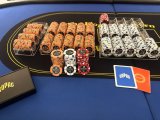ianpoker
Waiting List
Hey everyone
Calling all home game enthusiasts...
I'm looking for some advice on how to operate as a host/dealer in the smoothest way possible for my home cash game. I've seen threads regarding this topic but am searching for more concentrated info on how to manage things like obtaining buy-in money from players smoothly, making sure only live chips are in play, managing staggered cashouts, dealing with distracted players (always on their phone and needs reminder when its their action) and overall just keeping everything organized whille also dealing the whole time. I've got all of the essentials now (table, cards, chips, chairs) so just need to focus on logistics.
My conflict here is that I want to manage the game to a high enough standard to keep pace of play up and seem organized but on the other hand I don't want to come off as a hardhead and make things too controlling. My goal is also to make this game consistent with players that know poker and share the same motivation that I have to keep the game running fast. (I can't tell you how many times I've been to games where we play 1 hand every 5 minutes and it ends up being a nightmare). However this is difficult as I'm hosting at my college house with 5 other housemates who are not serious about poker but always want to play so i would feel bad excluding them.
My game will be .25/.25 NL with $25 starting stacks & unlimited rebuys. As of now I plan on just giving each player a barrel of fracs and a barrell of $1s and just use $5s for rebuys. However, I have like 300 fracs and kinda prefer having as many fracs on the table as possible so I am open to other chip breakdowns.
I am also considering creating some sort of promo/high hand jackpot but would like to think outside the box and offer rewards that do not hurt too much financially.
I wan't my game to be seen as poker coming first, and socializing/drinking to come second (compliments greatly).
^^^Overall just looking to get in conversation with anyone who has experience hosting low stakes home games that I can bounce questions off of and take bits and pieces from everyone to run a fun but properly structured home game that will keep people coming back!
Calling all home game enthusiasts...
I'm looking for some advice on how to operate as a host/dealer in the smoothest way possible for my home cash game. I've seen threads regarding this topic but am searching for more concentrated info on how to manage things like obtaining buy-in money from players smoothly, making sure only live chips are in play, managing staggered cashouts, dealing with distracted players (always on their phone and needs reminder when its their action) and overall just keeping everything organized whille also dealing the whole time. I've got all of the essentials now (table, cards, chips, chairs) so just need to focus on logistics.
My conflict here is that I want to manage the game to a high enough standard to keep pace of play up and seem organized but on the other hand I don't want to come off as a hardhead and make things too controlling. My goal is also to make this game consistent with players that know poker and share the same motivation that I have to keep the game running fast. (I can't tell you how many times I've been to games where we play 1 hand every 5 minutes and it ends up being a nightmare). However this is difficult as I'm hosting at my college house with 5 other housemates who are not serious about poker but always want to play so i would feel bad excluding them.
My game will be .25/.25 NL with $25 starting stacks & unlimited rebuys. As of now I plan on just giving each player a barrel of fracs and a barrell of $1s and just use $5s for rebuys. However, I have like 300 fracs and kinda prefer having as many fracs on the table as possible so I am open to other chip breakdowns.
I am also considering creating some sort of promo/high hand jackpot but would like to think outside the box and offer rewards that do not hurt too much financially.
I wan't my game to be seen as poker coming first, and socializing/drinking to come second (compliments greatly).
^^^Overall just looking to get in conversation with anyone who has experience hosting low stakes home games that I can bounce questions off of and take bits and pieces from everyone to run a fun but properly structured home game that will keep people coming back!

